Best Blue J Tax Alternative – Blue J Tax vs CPA Pilot
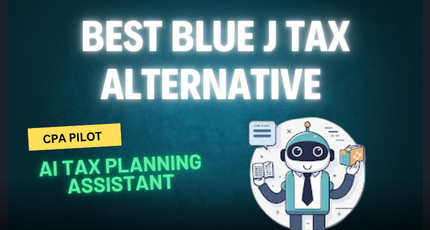
[Last Updated on 4 weeks ago]
Tax professionals face ongoing challenges — tight deadlines, complex IRS/state codes, staff shortages, and pressure to deliver ROI-driven strategies. AI tools are stepping in to help, but not all are built for the same audience.
Blue J Tax is strong at legal research and case law, making it useful for attorneys and academics. But for CPAs who need support with daily practice tasks like client communication, IRS responses, and workflow automation, it often falls short.
That’s where CPA Pilot comes in — an AI tax assistant designed by CPAs, built to cover the full practice workflow while keeping pricing flexible for firms of every size.
Table of Contents
Why Compare Blue J Tax and CPA Pilot?
Both Blue J Tax and CPA Pilot aim to make tax professionals more efficient, but they serve very different needs.
- Blue J Tax is built for legal research — great at analyzing case law and precedent.
- CPA Pilot is designed for practicing CPAs and tax firms — combining research with client communication, IRS responses, staff training, and workflow automation.
For professionals deciding where to invest, the comparison is clear: Blue J Tax helps interpret tax law, while CPA Pilot helps apply it in real-world practice.
What is Blue J?
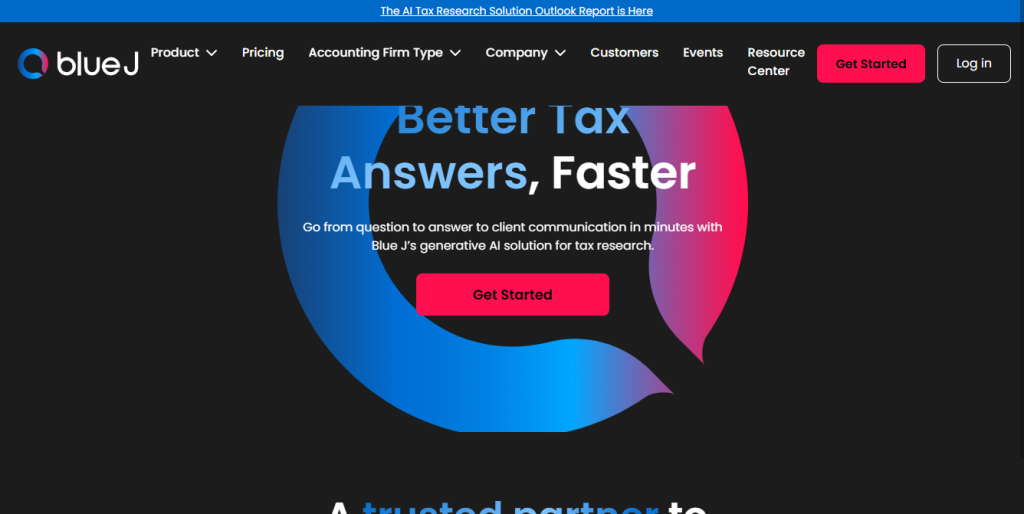
Blue J is a generative AI platform designed primarily for legal and tax research. Its strength lies in applying machine learning to case law, regulations, and precedents so professionals can quickly:
- Search and analyze complex tax law
- Predict outcomes based on prior cases
- Draft legal-style memos and research notes
- Access structured tax insights without manual digging
This makes Blue J particularly attractive for lawyers, tax advisors, and academic researchers who need deep tax analysis rooted in legal precedent.
What are the Limitations of Blue J Tax?
While powerful in its research niche, Blue J falls short for the day-to-day needs of CPAs and tax firms:
- Research-only focus → no tools for client communication, staff onboarding, or workflow automation
- No integration with tax software (Drake, Lacerte, UltraTax, ProSeries, etc.)
- Limited practice support → great for theory and precedent, less useful for seasonal tax practice demands
- Enterprise-style pricing → more aligned with large firms or research institutions than everyday CPA practices
Strategic Difference: CPA Pilot vs Blue J Tax
This is where CPA Pilot stands apart.
- Like Blue J, CPA Pilot provides authoritative IRS + state-cited research.
- But unlike Blue J, CPA Pilot extends beyond research — helping CPAs with client-ready emails, IRS notice responses, staff training, tax software support, and marketing automation.
- CPA Pilot is also built for practical workflows, with plans starting at just $19/month, making it accessible to solo CPAs, boutique firms, and enterprise practices alike.
In short: Blue J Tax is a research engine, while CPA Pilot is a full-practice AI assistant for CPAs and tax professionals.
What is a CPA Pilot?
CPA Pilot is an AI-powered assistant built specifically for CPAs, EAs, and tax professionals. Unlike Blue J Tax — which focuses primarily on research and precedent — CPA Pilot is designed to support the entire workflow of a modern tax practice.
Key Features of CPA Pilot
- Tax Research & Planning: Instant answers with IRS and state code citations, so you can trust the accuracy.
- Client Communication: Drafts professional emails, memos, and IRS notice responses in minutes.
- Staff Training & SOPs: Acts as an on-demand trainer, helping onboard staff and generating clear procedures.
- Tax Software Support: Built-in documentation for Drake, Lacerte, UltraTax, ProSeries, ProConnect, and QuickBooks Online.
- Marketing Automation: Generate newsletters, blogs, and social media content to engage clients.
- Affordable Pricing: Flexible monthly plans starting at $19/user, with rollover credits that never expire.
Strategic Difference: Why is CPA Pilot the Best Blue J Tax Alternative?
While both Blue J Tax and CPA Pilot offer advanced AI for tax research, their strategic focus is very different.
- Blue J Tax is designed for legal research and precedent analysis, making it useful for attorneys and academics who want to interpret case law.
- CPA Pilot, on the other hand, is built for practicing CPAs, EAs, and tax professionals who need more than just research. It covers the full spectrum of practice needs — from client communication and IRS notice drafting to staff training, workflow automation, and tax software support.
- Pricing also sets them apart: Blue J Tax targets large institutions with enterprise pricing, while CPA Pilot is affordable and scalable for firms of all sizes — from solo practitioners to multi-office practices. Explore CPA Pilot Plans →
👉 In short: Blue J Tax helps you understand tax law. CPA Pilot helps you apply it, communicate it, and manage your practice more efficiently.
Blue J Tax vs CPA Pilot: Feature-by-Feature Comparison
Here’s a side-by-side look at how Blue J Tax and CPA Pilot compare across key features:
| Feature / Capability | Blue J Tax | CPA Pilot |
|---|---|---|
| Primary Focus | Legal & tax research (case law, memos) | End-to-end CPA assistant (research, planning, comms, training) |
| IRS & State Code Citations | ✅ Yes, research-based | ✅ Yes, with direct IRS + state references |
| Client Communication | ❌ None | ✅ Drafts emails, IRS notice responses, client memos |
| Staff Training & SOPs | ❌ None | ✅ Onboarding, staff Q&A, procedure generation |
| Tax Software Support | ❌ No integration | ✅ Built-in support for Drake, Lacerte, UltraTax, ProSeries, ProConnect, QuickBooks Online |
| Marketing Automation | ❌ No | ✅ Create newsletters, blogs, social content |
| Pricing | 💲 Enterprise-level, geared to large firms | ✅ Flexible plans from $19/month with rollover credits |
| Best For | Lawyers, researchers, academic users | CPAs, EAs, and tax professionals of all firm sizes |
✅ Key Takeaway
- Blue J Tax = a strong research engine for tax and legal precedent.
- CPA Pilot = a full-practice AI tax assistant that combines research with real-world CPA workflows like communication, staff training, and tax software support.
👉 If you’re looking for the best Blue J Tax alternative, CPA Pilot is built to handle everything a modern tax practice needs — not just research.
Real-World Q&A: CPA Pilot vs Blue J Tax
1. How Accurately Can I Predict U.S. Federal vs. State Tax Outcomes When Moving Between States?
Blue J Answer (Review: Partial):Blue J allows users to pull up state tax statutes and see differences; it gives guidance by citing state tax law. But it tends to present generic comparisons and focuses heavily on states with well-documented case law.
CPA Pilot Answer (Accurate & Holistic):
- Simulates both the federal and all relevant state tax liabilities (income, itemized deductions, withholding, credits) when you move.
- Takes into account state-specific deduction limits, tax brackets, residency/domicile rules, and potential double-filing obligations.
- Offers scenario sensitivity: what happens if part-year residency, or if both states have income sourced in both.
Verdict:
- Blue J: Good for legal research, state law citations, but often high-level and sometimes lacks side-by-side computation with your actual numbers.
- CPA Pilot: More actionable: you get concrete numeric comparisons, not just legal reference.
👉 Why CPA Pilot Wins: Moving states often leads to unexpected burdens because of deduction limits and residency rules—CPA Pilot helps you see those burdens ahead of time.
2. How Should I Structure My Small Business Income Between W-2 Salary & Distributions to Minimize Tax + Compliance Risk?
Blue J Answer (Review: Research Focus):Blue J can surface legal rulings, IRS guidance, and case law about what counts as “reasonable compensation” for S Corporations, and highlight risk factors auditors look for.
CPA Pilot Answer (Precise & Context-Applied):
- Models your particular business numbers (profits, cash flow) under different mixes (e.g. higher salary + lower distribution vs vice versa).
- Compares the payroll tax cost vs self-employment tax + audit risk.
- Includes warnings based on recent IRS audit practices and rulings about “reasonable compensation.”
Verdict:
- Blue J: Strong legal-theory and authority, useful for identifying the rules.
- CPA Pilot: More utility—helps you choose which mix works, balancing tax savings and audit exposure.
👉 Why CPA Pilot Wins: Because in real small-business strategy, it’s not enough to know the rule — you need to see what you should do, numerically.
3. Can I Claim Foreign Tax Credits If I Earn Passive Income Abroad, and How Do Duplication / Treaty Rules Apply?
Blue J Answer (Review: Good Legal Depth):Will fetch the relevant treaty texts, IRS code sections, and case law about foreign tax credits, and “duplication” rules. It shows citation of statutes / treaty provisions.
CPA Pilot Answer (Accurate & Practical):
- Helps you compute potential foreign tax credit limits for your reported foreign passive income.
- Takes into account foreign withholding, local taxes paid, possible treaty benefit, and any double taxation avoidance.
- Offers example computation to show whether you would benefit or whether the foreign taxes are wasted (or partially unusable) under U.S. rules.
Verdict:
- Blue J: Excellent for research, shows what laws and treaties exist.
- CPA Pilot: Gives you actionable outcome: whether you should claim it, given your numbers.
👉 Why CPA Pilot Wins: Because in cross-border income, theoretical knowledge isn’t enough—numerical results make the difference.
4. How Do I Handle Rollover of Gains via Like-Kind Exchanges or Deferred Sales (Installment Sales) to Improve Cash Flow & Tax Timing?
Blue J Answer (Review: Law-oriented):Provides summaries of IRS rules for like-kind exchanges (IRC §1031), installment sales, relevant code sections, and pitfalls.
CPA Pilot Answer (Strategic & Financially Grounded):
- Models the impact on your cash flow, future tax liability, and timing when using an installment sale versus immediate recognition.
- For like-kind exchanges, shows whether deferring gains makes sense given depreciation recapture or cost basis adjustments.
- Alerts to audit risk, deadlines, and documentation you need to satisfy to use the strategy safely.
Verdict:
- Blue J: Helps you understand what the rules are.
- CPA Pilot: Helps you compare which path gives the best tax & cash outcome for you.
👉 Why CPA Pilot Wins: Because timing & cash flow matter just as much as legal permissibility — CPA Pilot helps plan for both.
5. What Are the Tax Implications of Selling RSUs (Restricted Stock Units) or Equity Compensation That Vest, Including AMT, State, and Capital Gains Timing?
Blue J Answer (Review: Good Source Material):Able to pull in IRS and tax court guidance about when RSUs are taxed (vesting events, ordinary income), how capital gains work post-vesting, and how certain state rules apply.
CPA Pilot Answer (Comprehensive & Tailored):
- Simulates the income recognition event (vesting), estimates ordinary income tax + payroll/withholding.
- Projects what your capital gain basis will be, how long you need to hold to get favorable long-term gain treatment.
- Looks at any AMT exposure, state withholding or state tax on equity, and if there are planning strategies (e.g. timing sale, bunching).
Verdict:
- Blue J: Good for reference, legal detail, guidelines.
- CPA Pilot: More precise: shows tax-impact numbers and timing, helps you decide when and how much to sell for optimal tax outcome.
👉 Why CPA Pilot Wins: Because with equity compensation, small timing differences can mean large tax differences; you want more than just “what are the rules.”
Which One Should You Use: Blue J Tax or CPA Pilot?
Choosing between Blue J Tax and CPA Pilot really depends on what role AI plays in your practice.
✅ Use Blue J Tax if…
- You’re a tax attorney, researcher, or academic focused heavily on case law and precedent.
- Your workflow is research-heavy and doesn’t require client communication, tax software integration, or practice management.
- You’re part of a large institution willing to invest in enterprise-level software primarily for legal/tax research.
✅ Use CPA Pilot if…
- You’re a CPA, EA, or tax advisor managing multiple clients and want an AI that goes beyond research.
- You need fast, accurate answers with IRS/state citations and formatted outputs (emails, memos, notices).
- You want a tool that integrates into your daily workflow — supporting tax software, training staff, automating marketing, and improving client communication.
- You’re looking for flexible, affordable pricing designed for firms of all sizes.
Strategic Difference Recap
- Blue J Tax = Research depth.
- CPA Pilot = Research + Communication + Training + Automation.
In short: If you want an AI legal research tool, Blue J Tax works. But if you want an AI tax assistant that actually runs with your practice, CPA Pilot is the stronger choice.
Final Verdict
If you’re a CPA, EA, or tax advisor searching for a Blue J Tax alternative, the choice comes down to your needs:
- Blue J Tax is strong for legal tax research and case law analysis, making it a good fit for attorneys and academic users.
- CPA Pilot, however, is built for tax practitioners who need more than just research. It delivers practice-ready AI support for tax research, client communications, IRS notices, staff training, tax software support, and even marketing automation — all at an affordable price.
👉 That’s why, in 2025, CPA Pilot stands out as the best Blue J Tax alternative — not just for research, but for running an efficient, profitable tax practice. View CPA Pilot Plans →
Blue J Tax Alternative FAQs
What is the main difference between Blue J Tax and CPA Pilot?
Blue J Tax is primarily a legal research tool focused on case law and precedent analysis, while CPA Pilot is an AI tax assistant built for CPAs and tax advisors. CPA Pilot not only handles tax research with IRS/state citations but also automates client communication, IRS notices, staff training, and tax software support, making it more practice-oriented.
Is CPA Pilot a good alternative to Blue J Tax for CPAs?
Yes. For CPAs and tax firms, CPA Pilot is a stronger alternative because it’s designed to fit directly into daily workflows. Unlike Blue J Tax, which is geared toward legal researchers, CPA Pilot supports emails, memos, marketing content, and tax software integrations, making it a full-service solution for tax professionals.
Does CPA Pilot include state tax codes like Blue J Tax?
Yes. CPA Pilot covers IRS tax code, IRS publications, and state tax codes for all 50 states, updated regularly. This ensures CPAs can confidently handle multi-state tax issues — something Blue J Tax provides mainly from a research standpoint, while CPA Pilot integrates the information into client-ready outputs.
How does pricing compare between Blue J Tax and CPA Pilot?
Blue J Tax pricing is structured for larger firms and institutions, often at enterprise-level costs. CPA Pilot, in contrast, offers flexible, affordable plans starting at $19/month per user, with rollover credits that never expire. This makes CPA Pilot more accessible for solo CPAs, small firms, and growing practices.
Which tool is better for tax research — Blue J Tax or CPA Pilot?
Blue J Tax excels at case law and precedent research, making it useful for attorneys. CPA Pilot, however, provides faster, practice-focused research with IRS/state citations plus actionable outputs (client letters, audit responses, planning memos). For CPAs who need to apply research directly to client cases, CPA Pilot is the more practical choice.
Can CPA Pilot replace Blue J Tax completely?
For CPAs and tax advisors, yes. CPA Pilot covers research needs with authoritative sources and expands into workflow automation, communication, and staff support. However, if you’re a tax attorney specializing in litigation or precedent-heavy cases, Blue J Tax may still serve as a complementary research tool.
Disclaimer: This article is provided by CPA Pilot for educational purposes. While we may offer tax software/services, the information here is general and may not address your specific facts and circumstances. It does not constitute individual tax, legal, or accounting advice. U.S. federal and State Tax laws change frequently; please consult a qualified tax professional before acting on any information.

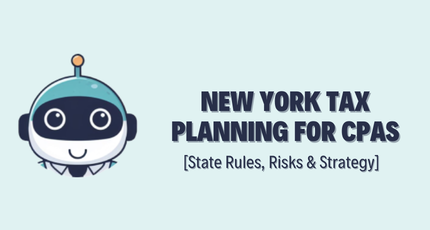
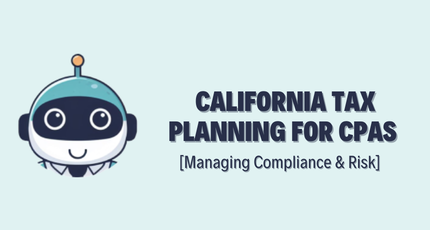
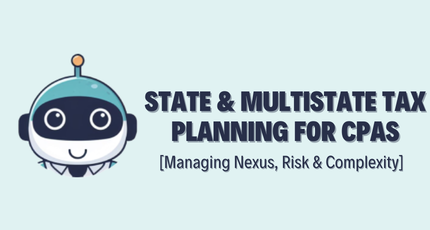
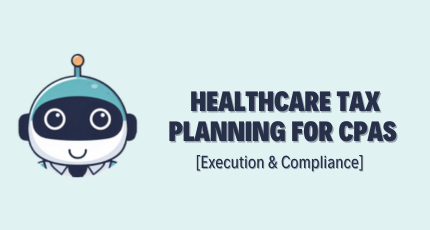

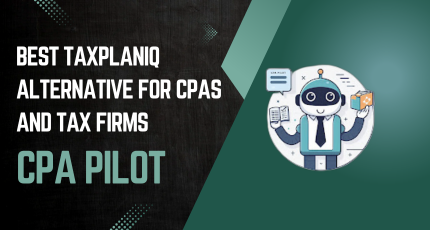
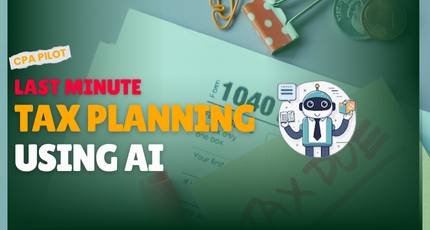

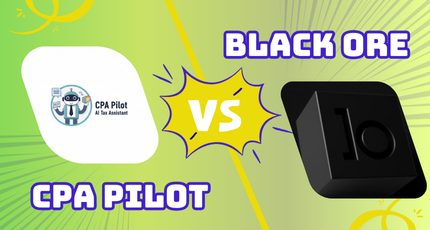
![CPA Pilot vs TaxGPT vs ChatGPT: Best AI Assistant For Tax Planning [2026]](https://www.cpapilot.com/blog/wp-content/uploads/2025/09/ChatGPT-vs-TaxGPT-vs-CPA-Pilot-Comparison.png)